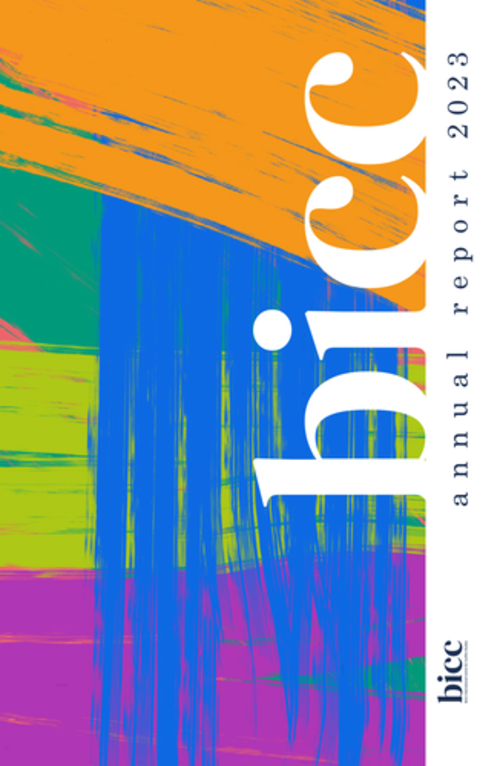Publications
bicc annual report 2023
Release Date
2024-09
Language
- –
Topics
- Agents and Patterns of Security and War
- Building Peace and Social Cohesion
- Dynamics of violent conflict
- Violent Environments and Infrastructures
- Migration and Forced Displacement
- Militarisation and arms control
It has been a long time since the world seemed so far from peace as it is today. War, violent and authoritarian assertion of power and social exclusion rather than cooperation are the new formulas for political action. Democracy and peace seem to be on the retreat in all regions of the world. bicc has been researching these disturbing developments for a long time and is trying to counteract these tendencies and strengthen peaceful forms of coexistence by providing targeted advice to political and civil society actors.
Research on protracted violent conflicts is at the core of our work. bicc has exceptional expertise in this area, as we have been conducting research on important conflict hotspots for many years and have the necessary technical, regional, and linguistic competence. We are very pleased that this expertise is in great demand by the media, politicians and practitioners: In the case of Afghanistan, for example, bicc is involved in political processes in a variety of ways (including research and evaluation) and advises political decision-makers.
In the case of Ukraine, bicc is one of the most important voices in Germany and develops concrete recommendations for action for German policy > PAGE 34. bicc has always paid particular attention to Sub-Saharan Africa. The numerous military coups in Africa in the recent past illustrate the disturbing development that the population considers the military, rather than the democratic government, the competent body for ensuring peace and order in the country. In this context, bicc is researching the violent conflicts in the western Sahel. Despite the military‘s seizure of power, violence fuelled by jihadist groups continues to increase and destabilise an entire region. Research into the consequences of violent conflicts is another longestablished area of work at bicc. This concerns first and foremost forced displacement, the effects of which have even affected German domestic policy. By posing the question under which conditions refugees can return home, bicc seeks to develop concrete solutions for existing refugee situations. Too often, we forget that refugees want to return to their home countries if this is possible in a safe and humane way.
Indeed, bicc continues to work in a solution-oriented and practical way. We do not give up hope for peace—even if this is only possible on a small scale. In this context, the HDP Nexus project is worth mentioning, in which we are investigating what notions of peace there are in local communities and how these can be better considered in providing development and humanitarian aid. For example, many societies have their own concept of peace that the international community just needs to be made aware of. Finally, the social division in Germany due to extremist tendencies is worrying. In North Rhine-Westphalia, for example, bicc plays a central role in bringing academics working on tendencies that threaten democracy together in a fruitful dialogue and in preparing their research findings for policy and practice.
As these examples of our work make clear, bicc is a place where we deal with profound conflicts, relate them to each other and try to develop feasible solutions to situations that seem hopeless. We owe this opportunity for research and consultancy to the state of North Rhine-Westphalia, which has supported us financially for 29 years. We would like to express our gratitude to them and to all the other generous supporters of our research and advisory projects.
Conrad Schetter, Director of bicc
PDF-Download

Cite as
Document-Type
BICC Annual report
Publisher
bicc
Place
Bonn



